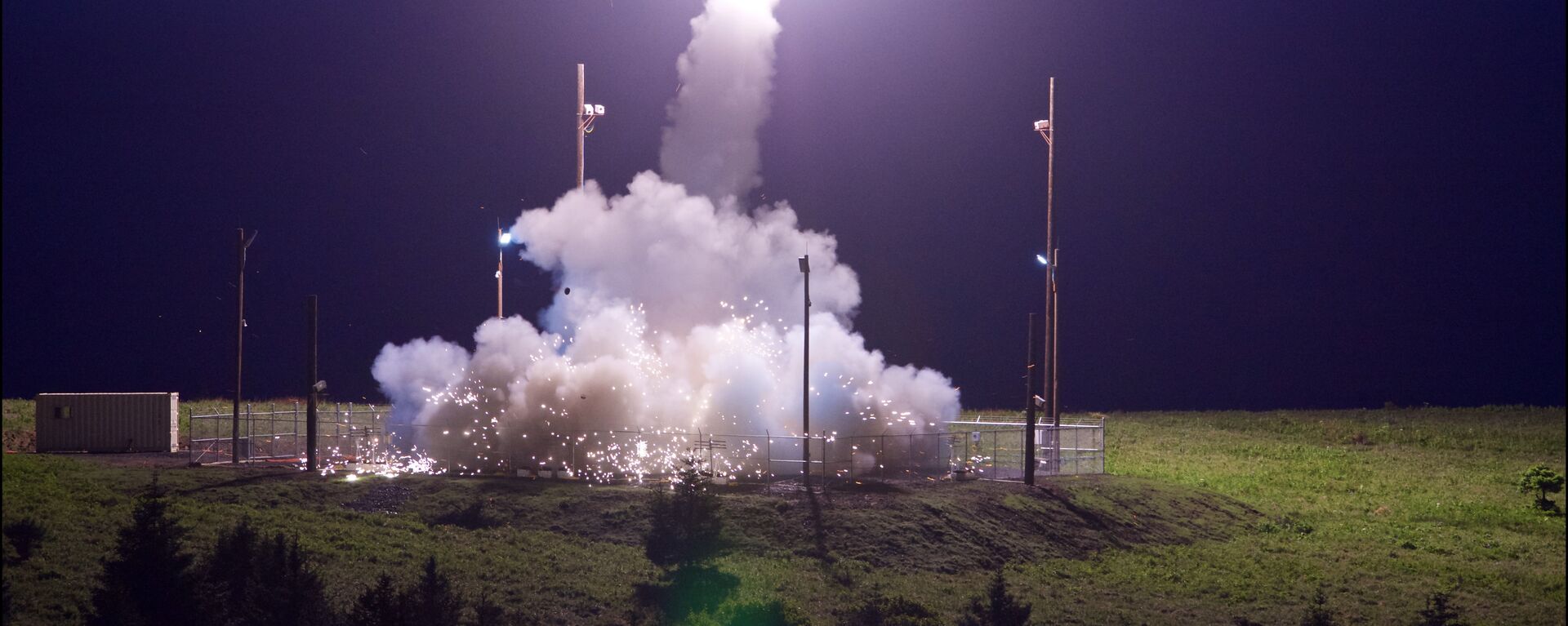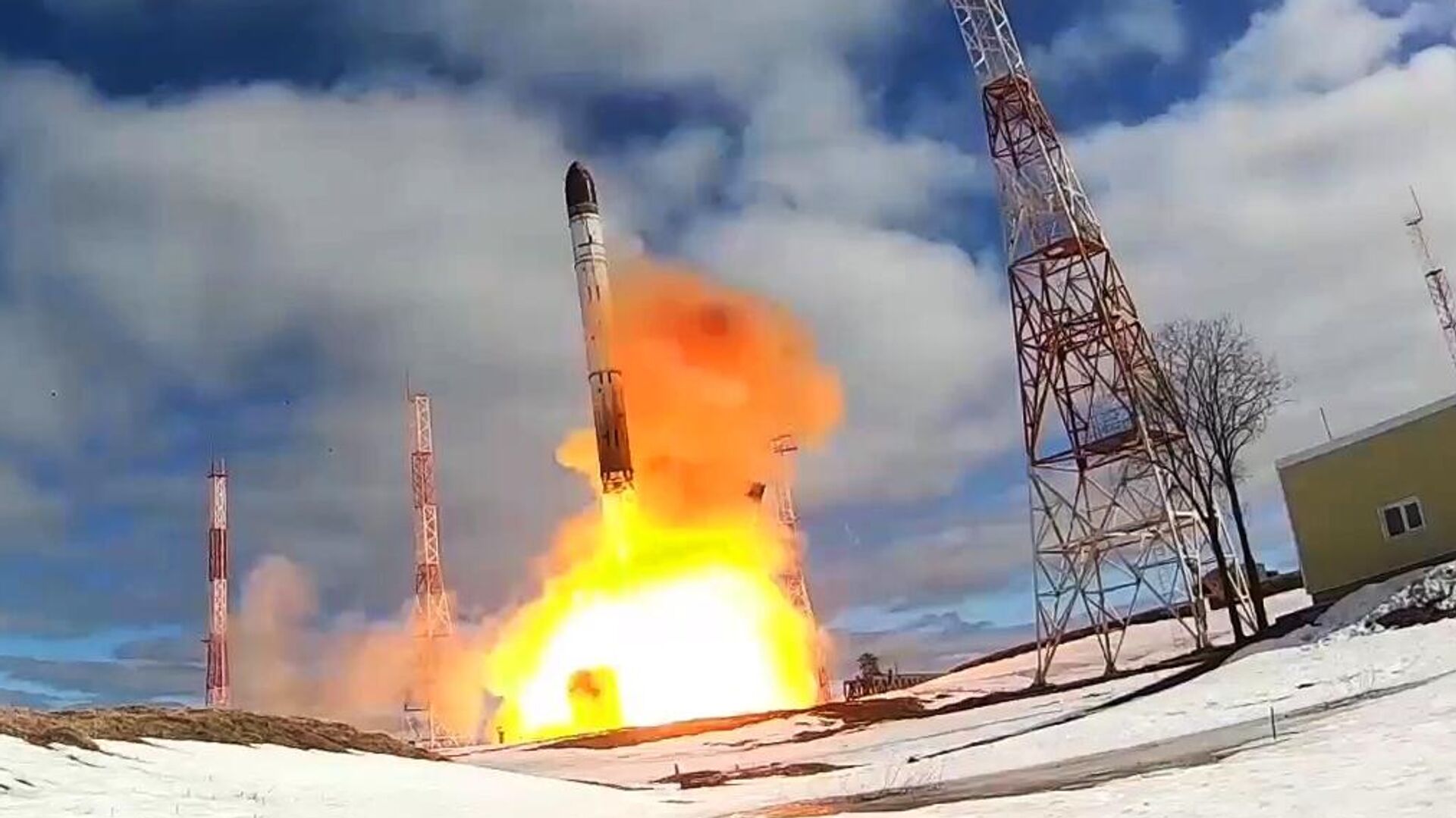https://sputnikglobe.com/20231025/us-may-seek-to-curb-russias-missile-tech-advancement-through-arms-control--1114479915.html
US May Seek to Curb Russia's Missile Tech Progress By Means of Arms Control
US May Seek to Curb Russia's Missile Tech Progress By Means of Arms Control
Sputnik International
The United States has recently submitted to Russia yet another batch of proposals related to issues of arms control and strategic stability, but it does not seem that this move by Washington was meant to achieve some kind of meaningful result, say prominent analysts on both sides of the Atlantic.
2023-10-25T17:06+0000
2023-10-25T17:06+0000
2023-10-25T18:18+0000
world
earl rasmussen
russia
us
dialogue
new strategic arms reduction treaty
https://cdn1.img.sputnikglobe.com/img/07e7/0a/07/1113997400_83:242:1095:811_1920x0_80_0_0_cbae8a21a135dacf37e9dcda76406e96.jpg
Earl Rasmussen, a retired Lieutenant Colonel of the US Army and an international consultant, has suggested that through such maneuvers, the United States is trying to shape the narrative and portray itself as a power that is “trying to control nuclear weapons and prevent World War III.”Pointing out that the United States had previously unilaterally pulled out of a number of international agreements – such as, for example, the Anti-Ballistic Missile Treaty and the Intermediate-Range Nuclear Forces Treaty – Rasmussen said he personally would not trust the US, “this current administration at least, on any type of agreement.”“I don't see anything really coming out of it. I see it's a method to try to maybe put a temporary hold in place and at the same time probably build up their own security measures and take other actions around. I don't see actual agreement coming to fruition, at least not with this administration,” he added.According to Rasmussen, it would seem unlikely that the Biden administration may be genuinely interested in making concrete steps to mend ties with Russia, as the powers that be in Washington appear to be dug-in with their “neocon-oriented Cold War mentality.”He also postulated that there will be no progress on resuming strategic stability dialogue between the US and Russia until a “change of administration” and a “major change in senior levels within the State Department” occur in the United States.“Obviously, Russia should keep open the potential for dialogue. But you need some substantive changes in policy and actions. And I just don't see that right now,” Rasmussen mused. “Look at the Middle East situation we've got. Who's vetoing any type of peace and ceasefire? Well, we don't have to look far. Do you really think that they have an honest view of having some type of strategic dialog that's honestly being engaged? I don't think so. I don't see any indication of that.”Meanwhile, Dmitry Suslov, deputy director of research at the Russian Council on Foreign and Defense Policy, argued that the leadership in Washington may actually be seeking to convince the American public that the hybrid war the US and its allies are currently waging against Russia won't spiral out of control.Suslov also echoed Rasmussen’s thoughts on the prospects of the US mending relations with Russia in the near future, arguing that the Biden Administration appears “committed to the continuation of the hybrid war,” adding that he personally does not believe a dialogue on strategic stability between Moscow and Washington may take place any time soon.“I think that as long as the US conducts [this] hybrid war against Russia, any resumption of any elements of this dialogue with the United States would be harmful and counterproductive to Russian security and to Russian interests, because it would basically legitimize the US hybrid war against Russia, and it would prove that indeed it is safe for the United States to continue this policy,” Suslov surmised.Commenting on the latest proposals Washington submitted to Moscow, Russian Deputy Foreign Minister Sergey Ryabkov said during a press briefing on Wednesday that Russia was unwilling to discuss matters such as arms control "in isolation from current events".Ryabkov stressed that resuming a dialogue on strategic stability between Moscow and Washington is “simply impossible in its previous form without a change in the fundamentally hostile attitude of the United States towards Russia."
https://sputnikglobe.com/20231016/moscow-ready-for-mirror-measures-if-us-deploys-arms-banned-under-inf-in-europe-1114224689.html
https://sputnikglobe.com/20231020/how-fast-is-russias-avangard-missile-1114346196.html
russia
Sputnik International
feedback@sputniknews.com
+74956456601
MIA „Rossiya Segodnya“
2023
News
en_EN
Sputnik International
feedback@sputniknews.com
+74956456601
MIA „Rossiya Segodnya“
Sputnik International
feedback@sputniknews.com
+74956456601
MIA „Rossiya Segodnya“
us russia arms control, us hybrid warfare, russian missile technology
us russia arms control, us hybrid warfare, russian missile technology
US May Seek to Curb Russia's Missile Tech Progress By Means of Arms Control
17:06 GMT 25.10.2023 (Updated: 18:18 GMT 25.10.2023) Recently, the United States has given Russia more batches of proposals related to the issues of arms control and strategic stability, but it doesn't seem that Washington's move was meant to achieve some kind of meaningful result, say prominent analysts on both sides of the Atlantic.
Earl Rasmussen, a retired Lieutenant Colonel of the US Army and an international consultant, has suggested that through
such maneuvers, the United States is trying to shape the narrative and portray itself as a power that is
“trying to control nuclear weapons and prevent World War III.” “They want to make it look like they're taking the initiative when actually, there's nothing new out there,” he specified. “I think also they probably have some type of concern. They probably want to wrap in whatever agreements. New missile technology that we do not have that Russia does have, to try to prevent the growth of that or to control that. So it's all self-interest rather than like global interests,” he stated.
Pointing out that the United States had previously unilaterally pulled out of a number of international agreements – such as, for example, the Anti-Ballistic Missile Treaty and the Intermediate-Range Nuclear Forces Treaty – Rasmussen said he personally would not trust the US,
“this current administration at least, on any type of agreement.”“I don't see anything really coming out of it. I see it's a method to try to maybe put a temporary hold in place and at the same time probably build up their own security measures and take other actions around. I don't see actual agreement coming to fruition, at least not with this administration,” he added.
According to Rasmussen, it would seem unlikely that the Biden administration may be genuinely interested in making concrete steps to mend ties with Russia, as the powers that be in Washington appear to be dug-in with their “neocon-oriented Cold War mentality.”
“I think they're very irritated that they were unable to obtain Crimea in 2014. They're unable to overthrow Assad in Syria. So I think they're very frustrated, almost everything that they've tried this go around has been a complete failure. And as a result, our whole economy is threatened as well. So I think they have no reverse gear. They do not believe in taking their foot off the accelerator,” he said.
He also postulated that there will be no progress on resuming strategic stability dialogue between the US and Russia until a “change of administration” and a “major change in senior levels within the State Department” occur in the United States.
“Obviously, Russia should keep open the potential for dialogue. But you need some substantive changes in policy and actions. And I just don't see that right now,” Rasmussen mused. “Look at the Middle East situation we've got. Who's vetoing any type of peace and ceasefire? Well, we don't have to look far. Do you really think that they have an honest view of having some type of strategic dialog that's honestly being engaged? I don't think so. I don't see any indication of that.”

16 October 2023, 07:37 GMT
Meanwhile,
Dmitry Suslov, deputy director of research at the Russian Council on Foreign and Defense Policy, argued that the leadership in Washington may actually be seeking to convince the American public that the hybrid war the US and its allies are currently waging against Russia won't
spiral out of control.“In order to prove their security, to prove that American security will not be undermined, the US is trying to reestablish the US-Russian dialog on strategic stability. And if they succeed in doing that, they will say, look, there is no risk to US security from Russia because, look, we maintain cooperation on nuclear weapons, and we control the risks of escalation and so on and so forth,” he elaborated. “They simply want to legitimize and justify the continuation of their hybrid war against Russia and prove to their own society and elites that it is absolutely safe for the United States to conduct the policy that they are conducting now.”
Suslov also echoed Rasmussen’s thoughts on the prospects of the US mending relations with Russia in the near future, arguing that the Biden Administration appears “committed to the continuation of the hybrid war,” adding that he personally does not believe a dialogue on strategic stability between Moscow and Washington may take place any time soon.
“I think that as long as the US conducts [this] hybrid war against Russia, any resumption of any elements of this dialogue with the United States would be harmful and counterproductive to Russian security and to Russian interests, because it would basically legitimize the US hybrid war against Russia, and it would prove that indeed it is safe for the United States to continue this policy,” Suslov surmised.

20 October 2023, 15:09 GMT
Commenting on the latest proposals Washington submitted to Moscow, Russian Deputy Foreign Minister Sergey Ryabkov said during a press briefing on Wednesday that Russia was unwilling to discuss matters such as arms control "in isolation from current events".
Ryabkov stressed that resuming a dialogue on strategic stability between Moscow and Washington is “simply impossible in its previous form without a change in the fundamentally hostile attitude of the United States towards Russia."




